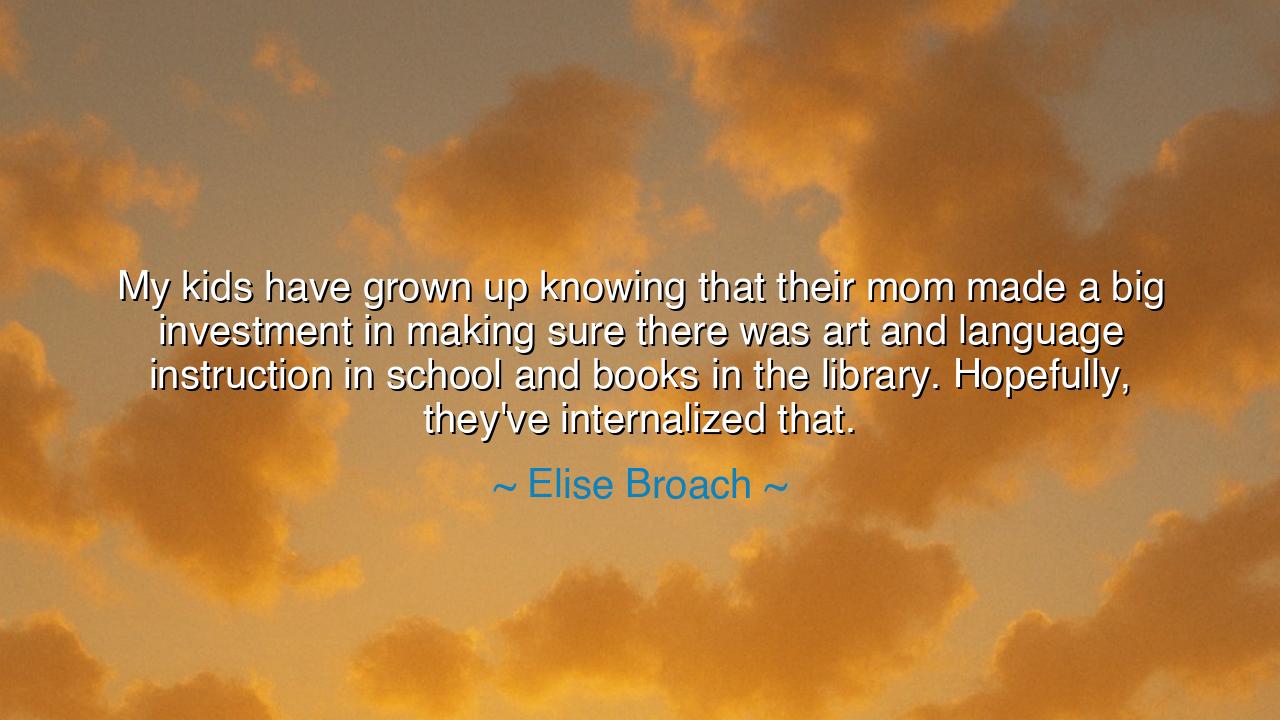
My kids have grown up knowing that their mom made a big
My kids have grown up knowing that their mom made a big investment in making sure there was art and language instruction in school and books in the library. Hopefully, they've internalized that.






When Elise Broach said, “My kids have grown up knowing that their mom made a big investment in making sure there was art and language instruction in school and books in the library. Hopefully, they've internalized that,” she was not merely speaking about education — she was speaking about legacy, about the sacred responsibility of one generation to plant seeds for the next. Her words are a quiet declaration of faith in the power of culture, creativity, and learning to shape the soul of humanity. In an age that often measures worth by wealth or fame, Broach reminds us that the true treasures we leave behind are found not in possessions, but in the minds and hearts we help cultivate.
This quote stands as a reflection of the ancient covenant between parent and child, teacher and student, civilization and its future. The ancients believed that to preserve knowledge was to preserve the spirit of the people. In Athens, every citizen was expected to support the arts and the education of youth, for they understood that without beauty, a nation’s strength would turn to tyranny. Broach’s “investment” is an echo of that wisdom — an act not of charity, but of duty. She recognizes that art and language are not luxuries, but lifelines — the means by which humanity remembers itself.
There is tenderness in her words, too — the wish that her children have “internalized” this truth, that they will carry it not as obligation but as instinct. For to internalize a value is to transform it from an idea into a living rhythm within the heart. It means her children will not simply know that education matters — they will feel it, act upon it, and extend it forward. This is how civilizations endure: through the quiet transmission of moral and cultural inheritance, passed not through commands, but through example. Her investment is not only in books and classrooms, but in consciousness itself.
The story of Hypatia of Alexandria, the great philosopher and teacher of antiquity, reflects the same eternal principle. Her father, Theon, taught her mathematics and philosophy in an age when women were often denied such knowledge. She, in turn, became a beacon of wisdom, teaching generations of students who carried her thought far beyond her lifetime. Theon did not know that his lessons would echo through centuries, just as Broach cannot know how far her investment in art and language will reach. Yet both understood the same truth: when you nurture the human mind, you participate in eternity.
Broach’s words also speak to the sacred power of the mother as cultivator — not merely of bodies, but of minds and ideals. The mother who fights for art in schools and books in libraries is the modern equivalent of the guardian of the temple — the one who defends light against the creeping shadows of ignorance. Her work may seem small in the daily struggle, but its effects are vast and invisible. Where there are books, there are ideas. Where there is art, there is empathy. And where there is empathy, there is hope.
Her reflection carries another lesson: that true investment is generational. Money spent on art, on language, on learning — these do not yield immediate profit, but they yield civilizations. The cathedrals of Europe, the temples of Asia, the universities of the Enlightenment — all were built by people who understood that the most important things we create are not for ourselves. To invest in education and art is to declare that the future matters, that the unseen generations to come deserve beauty, wisdom, and truth.
And so, the teaching for future generations is this: do not hoard your gifts — sow them. Build libraries, support teachers, paint murals, tell stories, and protect the fragile spaces where imagination can breathe. For when we make such investments, we are not just improving schools; we are fortifying the spirit of humanity itself. The children who grow up surrounded by books and art will grow into adults capable of compassion, creativity, and vision — and they, in turn, will teach others.
Thus, let Elise Broach’s words endure as a call to all who love the world: invest in the unseen, and trust that it will grow. The truest wealth is the wisdom we inspire, the curiosity we awaken, the courage we pass down. One day, her children — and ours — will walk through libraries we built, read words we protected, and sing songs we once fought to preserve. And in their voices, the echo of our care will live on — the eternal melody of a people who believed that art and learning were not luxuries, but the lifeblood of the soul.






AAdministratorAdministrator
Welcome, honored guests. Please leave a comment, we will respond soon